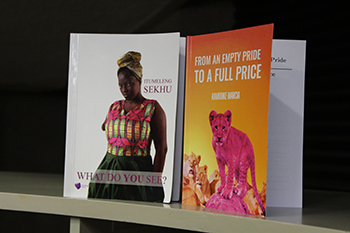Latest News Archive
Please select Category, Year, and then Month to display items
13 January 2020
|
Story Eugene Seegers
|
Photo Anja Aucamp
 Spearheading the digital expansion of the conversational Sesotho course is IDEAS Lab Director, Johann Möller (middle). With him are from the left: Prof Pule Phindane, CUT; Dr Brenton Fredericks, CUT; Bahedile Letlala, UFS Department of African Languages; and Dr Elias Malete, UFS Department of African Languages.
Spearheading the digital expansion of the conversational Sesotho course is IDEAS Lab Director, Johann Möller (middle). With him are from the left: Prof Pule Phindane, CUT; Dr Brenton Fredericks, CUT; Bahedile Letlala, UFS Department of African Languages; and Dr Elias Malete, UFS Department of African Languages.
For many years now, the UFS has been offering a one-year course in conversational Sesotho for staff members; this can then be followed up with the one-year course in advanced conversational Sesotho. The conversational Sesotho for students in the Faculty of Education was introduced in 2018 at the UFS.
The Central University of Technology (CUT) needed a conversational course for its first-year students and approached the Department of African Languages for the development of such a course. Living as we do in a multilingual country; this additional language skill opens doors and often hearts as well.
Using instructional design principles
However, the need was identified by both CUT and UFS to present this crucial information in a way that would be more appealing to digital natives as well as to those less familiar with technology. The Department of African Languages on the UFS Bloemfontein Campus, together with relevant departments from the CUT, approached the IDEAS Lab located on the UFS South Campus, since they already have a reputation for being a specialist on broadcasting and repackaging curricular content for digital presentations. The IDEAS Lab provided technical advice and built the multimedia programme, which will help the user to hear and practice phrases in Sesotho, using instructional design principles. The course will be available to both staff and students belonging to the two universities.
Room for growth
Johann Möller, Director of the IDEAS Lab, says this pilot programme will give both institutions the opportunity to test the use of multimedia for language acquisition. He adds, “Language is extremely complex, and we would like to expand this learning aid in the future.” In fact, the original design has room for growth built into it.
To keep things simple for the user and the building team, it was decided to start out with only four potential everyday scenarios where a staff member would like to speak Sesotho: Firstly, how to greet other persons from different genders; secondly, potential scenarios one might encounter in the university environment itself; thirdly, how to deal with situations at a hospital; and finally, how to use one’s language skills at a filling station.
Pronunciation is key
Each scenario contains three to four conversations that the learner can revise, along with images and audio that illustrate the situation and assist with correct pronunciation. The system does not allow the user to progress unless they have listened to the pronunciations of the sample sentences or phrases.
Further reading material and vocabulary lists are also provided, with the result that people who are using the programme can learn at their own pace. The authoring software Articulate Storyline was used to build the individual scenarios and each conversation or lesson within it. The lessons are also not dependent on an internet connection; they can be downloaded onto a flash memory drive and used offline.
UFS Library book launch programme fosters dialogue between students and authors
2017-03-30

The University of the Free State (UFS) Sasol Library has hosted a series of book launches since 2016, bringing to the Bloemfontein Campus various new and seasoned authors who share their stories with the campus audiences. The Launch Your Book at the Library Programme hosted two authors on 23 March 2017, Itumeleng Sekhu and Marcia Ramodike. Both authors spoke about their life-changing experiences and shared their heart-wrenching stories, filled with courage and hope.
“Libraries must take the lead in creating dialogue, expression of ideas and inculcating a culture of reading and writing. This programme was also established to bridge the gap and find ways to encourage students to read and write, by creating a platform where they can interact with authors and see that people who write books are ordinary people with real stories to tell,” said Marcus Maphile, Assistant Director: Library Marketing and Community Engagement.
Speaking about her book, Itumeleng Sekhu described her experiences from childhood and her life as a disabled person after being severely burnt in a fire accident in her home as a baby. She said: “I tried to commit suicide several times because I had lost hope. Eventually after failing to do so, I realised at some point that it was time for me to let my light shine through.” She wrote her book, titled What Do You See?, which has received substantial media coverage, to encourage others who live with painful experiences, disabilities and what she terms “internal wounds”, hoping that her experiences could help to heal them.
Marcia Ramodike’s book, An Empty Pride to a Full Price, paints a picture of her life as a youth grappling with adult issues. She describes her pain after her mother’s death, and her constant battle with the legacy of the difficult socio-economic conditions she grew up in. When students asked Ramodike what she thought the right time was to write a book, she responded, “today is the right time to write your story”.
The UFS Library has hosted 16 book launches since 2016, with the biggest being the launch of Zubeida Jaffer’s book Beauty of the Heart. The programme aims to provide access to information and to share and debate ideas in support of democracy and freedom of speech.